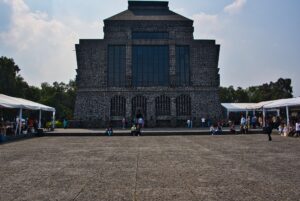As part of our ongoing “Women In Architecture” series, we’re sharing background on a trailblazing architect and educator who rooted her work in humanitarianism, Ruth Rivera Martín. From her radical contributions to Mexican architecture to the inspiration she instilled in her students, Martín’s impact is unquestionable. Learn more about her life and accomplishments below:
The Life of Ruth Rivera Marín
Rivera Marín was born in Mexico City on June 18, 1927. Born into an environment of artistic flair, Ruth Rivera Marín hailed from a lineage steeped in creativity and brilliance. The daughter of iconic muralist Diego Rivera and writer Guadalupe Marín, she lived in a world where artistry was the language of expression. This rich background not only influenced her early life but also provided a foundation that would shape her approach to architecture.
Eager to carve her own niche, Rivera Marín pursued her architectural education at the College of Engineering and Architecture at the National Polytechnic Institute. With determination, she emerged as its first female student, breaking conventional norms. Under the mentorship of architectural luminaries like Mario Pani and Hannes Meyer, Rivera Marín honed her skills, adopting a unique vision that merged traditional elements with modern passions.

Notable Works and Achievements
Rivera Marín’s illustrious career is a blend of iconic designs and transformative contributions to the field of architecture. In a world predominantly led by men, she rose as the first female professor of architecture at the National Polytechnic Institute, paving the way for future generations of women in the field. Beyond this, her pivotal role in founding the National College of Architects speaks volumes of her dedication to elevating architectural standards and practices in Mexico.

Her design elements reflected a deep understanding of urban development. She was instrumental in crafting various housing projects in Mexico City, where her creations transcended traditional designs. Her most recognized work was the Anahuacalli Museum in Coyaoacán, which she built with her father and fellow architect Juan O’Gorman. Each of her designs resonated with Mexican modernity, finding a perfect balance of aesthetic allure and functional utility.
Arguably her most profound impact lies in her role as an educator. Rivera Marín’s tenure as a professor has touched the lives of countless students, instilling in them a love for architecture and design. Especially for female students, she was more than just a professor; she was a beacon of inspiration, showing them that with passion and perseverance, they too could redefine the boundaries in the architectural landscape.
Ruth Rivera Marín’s contributions are deeply etched in Mexican architectural history. Her edifices stand as landmarks of her visionary prowess. However, beyond brick and mortar, her true legacy is in the minds she influenced and the paths she paved for future architects. She remains an enduring symbol of dedication, talent, and groundbreaking achievements, inspiring countless individuals to dream big and break barriers.

